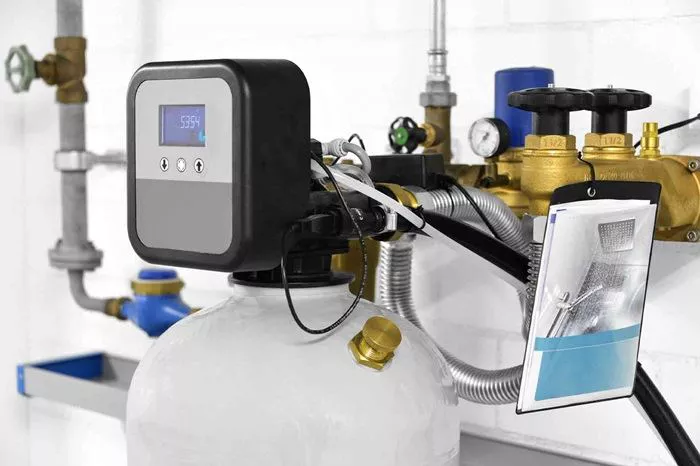Water softeners are essential appliances for treating hard water, which can cause mineral buildup in pipes, appliances, and fixtures. The cost of a water softener varies depending on several factors, including type, size, and features. Understanding these variables will help you make an informed decision about the right water softener for your needs and budget.
1. Types of Water Softeners and Their Costs
Water softeners come in different types, each with its own price range. Here’s a breakdown of the main types and their typical costs:
Salt-Based Water Softeners
Overview: Salt-based water softeners use ion exchange to remove calcium and magnesium ions from water. They are the most common type and are effective for treating hard water.
Cost Range: Typically, salt-based systems cost between $400 and $2,500. The price varies based on capacity, features, and brand.
Additional Costs: In addition to the initial purchase cost, you’ll need to factor in the cost of salt, which can range from $5 to $10 per bag. Regular maintenance and occasional servicing may also add to the overall cost.
Salt-Free Water Softeners
Overview: Salt-free systems use a different method, such as conditioning or descaling, to prevent mineral buildup rather than removing minerals. They are often marketed as maintenance-free.
Cost Range: These systems generally cost between $500 and $3,000. The higher end of the range includes models with advanced features and larger capacities.
Additional Costs: Salt-free systems don’t require salt but may need periodic replacement of filters or media, which can add to the long-term cost.
Dual-Tank Water Softeners
Overview: Dual-tank systems have two tanks, allowing one to regenerate while the other is in use. This ensures a continuous supply of soft water.
Cost Range: Dual-tank systems typically cost between $1,000 and $4,000. The price depends on the size, brand, and features.
Additional Costs: Maintenance and salt costs are similar to those for single-tank systems, but dual-tank systems may have higher installation costs due to their complexity.
Reverse Osmosis Systems
Overview: While primarily used for water purification, some reverse osmosis systems include water softening features. They are more comprehensive in their water treatment capabilities.
Cost Range: Reverse osmosis systems with water softening capabilities usually cost between $500 and $2,500.
Additional Costs: Regular filter replacements and maintenance can add to the overall cost.
See also: How Much Is A Cord Of Wood? Understanding Costs And Measurements
2. Factors Affecting the Cost of a Water Softener
Several factors influence the cost of a water softener. Understanding these factors will help you choose a system that fits your needs and budget:
Size and Capacity
Overview: The size and capacity of a water softener determine how much water it can treat before needing regeneration. Larger systems are generally more expensive but are necessary for households with high water usage.
Cost Impact: Systems designed for larger households or high water usage can cost more, ranging from $800 to $4,000.
Features and Technology
Overview: Advanced features such as digital controls, programmable settings, and Wi-Fi connectivity can increase the cost of a water softener.
Cost Impact: Basic models may cost less, while systems with advanced features can be significantly more expensive, adding several hundred dollars to the total cost.
Brand and Quality
Overview: Brand reputation and build quality can affect the price of a water softener. Well-known brands with high-quality components may cost more but often offer better reliability and customer support.
Cost Impact: High-end brands and models can cost between $1,000 and $4,000 or more, while budget brands may offer lower prices but potentially less durability.
Installation Costs
Overview: Installation costs vary depending on the complexity of the installation and the location of the water softener.
Cost Impact: Professional installation can range from $200 to $500 or more. Some systems are designed for DIY installation, which can save on installation costs but requires a certain level of expertise.
See also: Breaking Down The Cost Of AC Units: What You Need To Know
3. Long-Term Costs of Owning a Water Softener
In addition to the initial purchase price, consider the following ongoing costs associated with owning a water softener:
Salt and Chemicals
Overview: Salt-based systems require regular salt refills, which can add to the cost of ownership.
Cost: Expect to spend $50 to $100 annually on salt, depending on your water usage and the size of the system.
Maintenance and Repairs
Overview: Regular maintenance, such as cleaning and checking for leaks, can help extend the life of your water softener.
Cost: Annual maintenance costs can range from $100 to $300. Repairs may cost more, depending on the issue and the age of the system.
Filter Replacements
Overview: Some water softeners have filters that need to be replaced periodically.
Cost: Replacement filters can cost between $50 and $150, depending on the system and type of filter.
4. Choosing the Right Water Softener for Your Needs
To determine the best water softener for your household, consider the following:
Water Hardness Level: Test your water hardness to choose a system with the appropriate capacity.
Household Size: Larger households may need systems with higher capacity or dual-tank configurations.
Budget: Balance your initial cost with long-term expenses to find a system that fits your financial situation.
Conclusion
The cost of a water softener varies widely based on type, size, features, and brand. While the initial investment can range from $400 to $4,000, considering long-term costs such as salt, maintenance, and repairs will help you understand the total cost of ownership. By evaluating your water needs and budget, you can select a water softener that provides the best value and meets your household’s requirements.
Related Topics:

